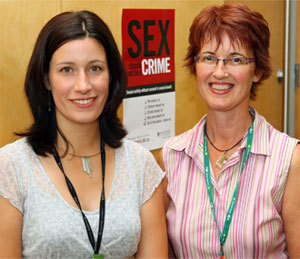 |
| Kim Mason and Gaye Wishart formulated Dalhousie's Get Consent program. (Nick Pearce Photo) |
“No means no. Silence means no. Not now means no. Drunk means no.”
Dalhousie’s new sexual assault prevention initiative – the ‘Get Consent’ campaign – is hoping to send a clear message about a complex subject.
Adapted from a University of Toronto initiative, the goal is to emphasize that sexual consent isn’t just about verbal messages, and that there is an active need for both partners to communicate and get consent. Just because you don’t hear “no” doesn’t mean you have the green light.
“Consent isn’t just ‘yes’ or ‘no,’” says Kim Mason, residence education coordinator with Housing and Conference Services. “That’s the main message of the campaign.”
As well, the campaign hopes to reach more students and cover more information than in past years.
“In terms of traditional sex education, it’s always more focused on the female. This campaign is more focused on the partnership – there’s responsibility for both parties to consent,” adds Gaye Wishart, an advisor in the office of Human Rights, Equity and Harassment Prevention.
Until now, Dal has promoted harassment prevention primarily through resident assistants, peer educators and cluster leaders and has made resources like videos and pamphlets available to them. With posters, a new website, and a presence on campus message boards, as well as the original education component, Get Consent will be a much more prominent campaign.
“We’d rather prevent a problem than have to untangle it once it’s already happened,” says Ms.Wishart.
